Born from Lessons of WWII, U.S. Naval War College International Program Connects World’s Navies One Class at a Time
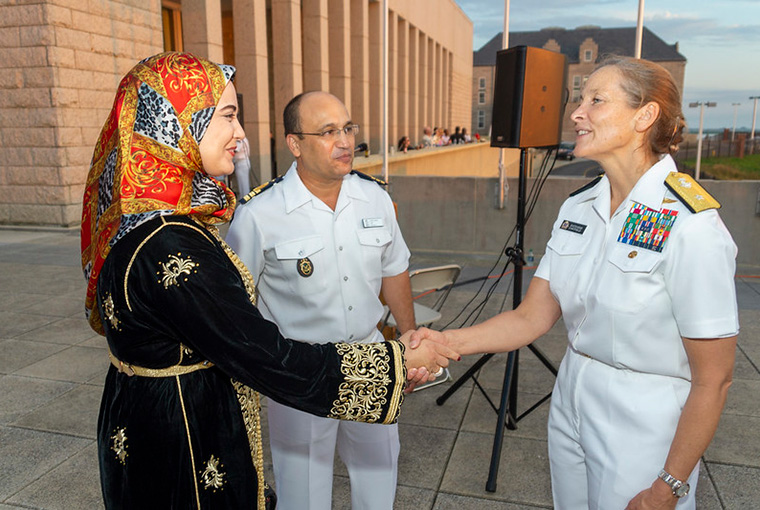
NEWPORT, R.I. -- On a beautiful summer night, the international students of the U.S. Naval War College formed up to be presented to the college president.
The collection of wildly different uniforms spoke about the variety of their home nations – short sleeves for tropical summers, braids, epaulets, patches and pins.
Their spouses were also dressed for the occasion, some wearing traditional attire that added to the colorful scene.
The emcees did their best with the names, presenting each person to applause from the small crowd gathered on Colbert Plaza, with flags of the 76 foreign nations present whipping on poles.
The students and their spouses giggled a little when the pronunciations weren’t exactly correct.
The whole scene spoke to the remarkable nature of the moment: A lot of cultures, nations, languages and traditions were present in one small corner of the U.S. Navy in Newport, Rhode Island – as has been true since 1956.
“The work that you do, and the relationships that you build over the next 10 months, will be the key to all of our future peace and security,” college president Rear Adm. Shoshana S. Chatfield told the group.
Born from war
As the United States faces global competition, with increasingly sophisticated adversaries, a small program born from the lessons of World War II may produce relationships that are more important than ever, college officials say.
The U.S. Naval War College hosted its first class of international officers in the summer of 1956, in a course started by the then-chief of naval operations, Adm. Arleigh Burke.
Called the Naval Command College, the graduate-level program consisted of officers from 23 nations that were friends and allies in the early part of the Cold War.
Burke – a hero of WWII – saw that alliances could have their roots in friendships, and friendships are often best formed in school.
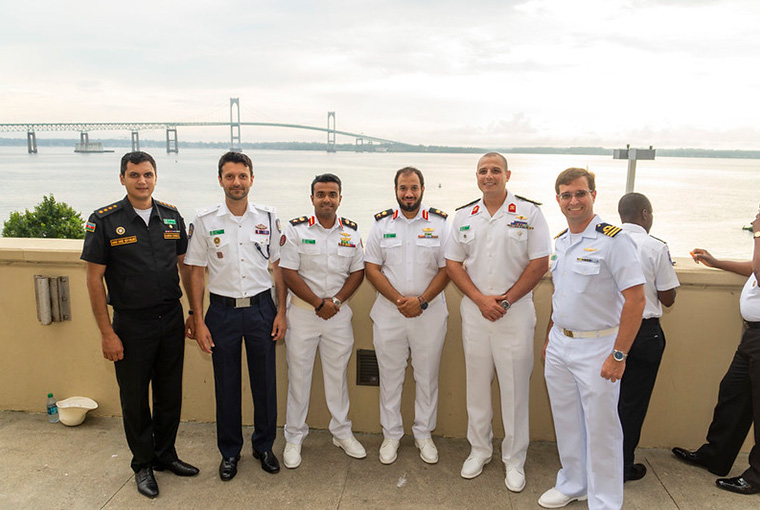
International students at the U.S. Naval War College attend a welcome reception on Colbert Plaza on Aug. 6.
(U.S. Navy photo by Cmdr. Gary Ross/Released)
“He had the realization that the men, the shipmates, that he could really trust and count on in leadership positions at the strategic level were his fellow heads of navy from international partners,” said Capt. Kevin McGowan, who directs the Naval Command College program.
“On the importance of personal relationships, he had the view that had he been able to meet these other officers when they were commanders and captains, perhaps that war in the Pacific never would have happened.”
Burke said that three countries in particular must be invited: Japan, Italy and Germany – America’s former adversaries.
“It you think about where we were in 1956, coming out of World War II and through that period of reconstruction, it was as important or more important that the former Axis powers, our former enemies, were part of this partnership program,” McGowan said.
The nations in that first class were Argentina, Belgium, Brazil, Chile, Colombia, Ecuador, France, Germany, Greece, Italy, Japan, Korea, Netherlands, Norway, Philippines, Peru, Spain, Thailand, Turkey, Uruguay, Venezuela – and, in a sign of the times, China and Cuba.
Participation in the program became known as a steppingstone, a hallmark of an officer on the rise. Its graduates went on to top leadership positions back home, and in 63 years more than 400 have now served as heads of their own navies.
For example, the current commander of the Estonian Navy is a 2016 graduate. From the class of 2013, four alumni went on to lead the navies of El Salvador, Ghana, Sweden and Lebanon.
People liked the course so much, in 1972 a second college for more junior international officers was added, called the Naval Staff College.
To date, more than 4,800 international military officers have graduated from these two programs, creating an alumni network that stretches across six of the world’s seven continents.
Bringing the international view
These officers come to Newport for nearly a year of graduate-level study alongside their American counterparts. Their subject is defense studies, and they take lectures on geopolitics and strategy.
The assigned reading – up to 600 pages a week – is tough even for a native English speaker. It includes military thinkers such as Carl von Clausewitz, Alfred Thayer Mahan, Thucydides and Sun Tzu.
The international students bring an outside view to class discussions, organizers said.
“They provide the international perspective from their countries, so you don’t get U.S. group-think going on in a seminar with eight U.S. students,” said Capt. Michael Marston, director of the Naval Staff College program. “They have a completely different take, which is fantastic.”
And while the academic work is important and takes a big chunk of their time – some will earn a master’s degree for it – program officials say the relationships built are equally important.
“We play a role in not just educating but also connecting the future leaders of the world’s naval services,” Marston said at the group’s welcome ceremony.
“They will read, write and think critically and reflect on some of the most pressing strategy and security problems of our time,” he said. “Then they will go home to their countries to build even further on their success – and continue to nurture the friendships they established here.”

Nirmal Verma, the retired four-star chief of the Indian Navy, was a member of the Naval Command College’s class of 1993. His was a famous class: Nine of the 36 members went on to become the leaders of their home navies.
“The course was of tremendous help to better understand the United States – all facets of governance, its military, its people, industry, you name it,” said Verma, who is now on the Naval War College faculty as a CNO Distinguished International Fellow.
“The United States is the leader of the world, and so you need to understand what drives its policy,” he said. “That was the most important takeaway for me.”
The bond from those days continues to be strong. Verma said his class has always kept in touch, sometimes visiting each other’s nations on official business or just for a social call. In the pre-Internet years, they circulated newsletters with updates contributed by the members.
“You get to know each other extremely well. You get to know about your international colleagues’ countries, the cultures, how their militaries operate,” he said.
Outside the classroom
It’s not only the officers. Their spouses and children also form close friendships.
For instance, each international student in the intermediate course gives a talk about his or her home country from the stage of the college’s Pringle Auditorium. Usually the whole family participates, often dressed in national attire.
The presenting student serves a sample of a traditional meal to the class. For that afternoon, the Naval Staff College wardroom becomes the busiest place on campus, with the other international families stopping by to sample the cuisine and catch up with each other.
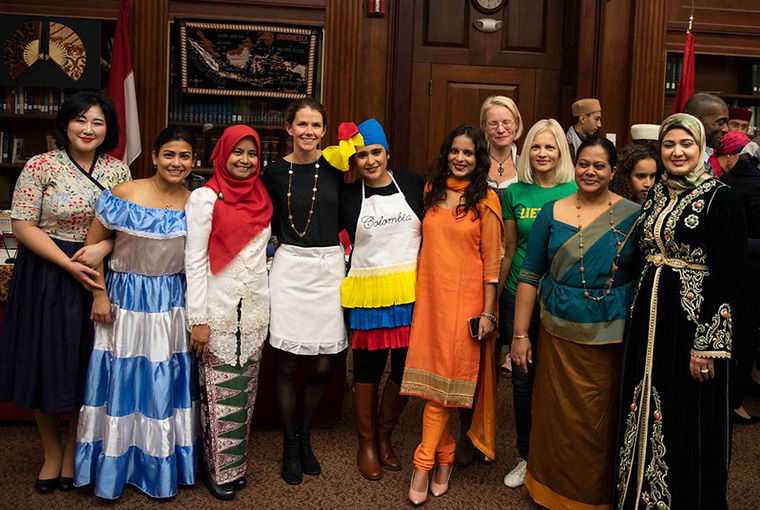
U.S. Naval War College international students hosted an international cuisine night on Nov. 23. Students and their families dressed in national attire and served samples of native dishes to their classmates and guests. Gatherings such as this one build camaraderie among the international students, their families and their U.S. classmates.
(U.S. Navy photo by Mass Communication Specialist 2nd Class Tyler John/Released)
“You make some great friends. We treasure the time we spent as families. Our friendships don’t end at the college. They continue way after that,” Verma said, remembering his class experience.
These relationships can be useful professionally, as well, as Arleigh Burke intended.
“Where you have situations arising in your region, if you know somebody there, all that you need to do is make a phone call and things happen,” Verma said.
A portion of the education takes place far away from Newport.
These students go on field study trips across the United States. The point is to introduce them to American culture – from Wall Street to the West Coast, from Google’s corporate headquarters to gumbo in New Orleans.
This year, the list includes visits to a soybean farm outside of Chicago, the California redwoods near San Francisco and the Boeing offices in Seattle. They will also visit Nashville, Salt Lake City, Phoenix and Washington, D.C.
The bonds are cemented on these trips, participants said.
The first excursion for this year’s international officers was to the USS Constitution museum ship in Boston, along with other historic sites from the Revolutionary War. The students had only just started residence in late summer, and most were still waiting for their families to arrive. It was a bit like freshman week.
“If you ask me before Boston and after Boston, this is the key, the first field trip,” said Col. Zaid Allam of the Lebanese Armed Forces.
By October, Allam said, “We feel like we’ve known each other for years.”
From the Middle East
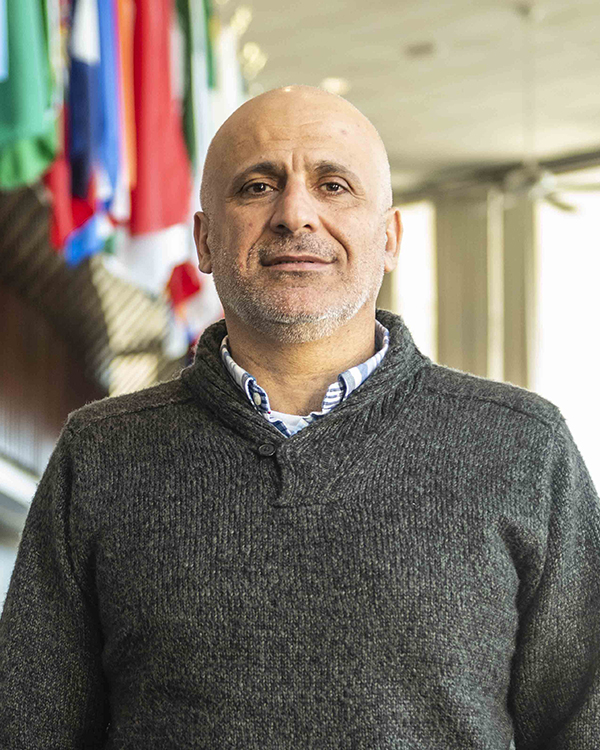
Col. Zaid Allam, Lebanon
(U.S. Navy photo by MC2 Tyler John/Released)
Allam came to Newport as a 27-year veteran of the Lebanese Armed Forces, where he is a surface warfare officer in the Navy. He won the chance to study aboard by scoring in the top 10 percent of his class at the Lebanese staff and command college.
He brought his wife, Lina, and their two children, 15-year-old Lea and 8 year-old Jawad for the full American experience. They jumped right in: Lea attends Middletown High School and Jawad – who now goes by Jay to his U.S. friends – is at Aquidneck Elementary for the year.
“My kids are very excited to be here in the States because they know the States from movies and this kind of stuff,” Allam said. It was more of a sacrifice for Lina, who closed her hair and makeup salon in Lebanon for the year. She wasn’t sure if she could make friends in unfamiliar New England, Allam said.
“They had an idea that in the USA, the social life doesn’t exist compared to Lebanon. But when they came here, they were surprised, especially my wife,” said Allam, whose family is living in U.S. Navy housing outside the base in Middletown.
“She said, ‘Everyone I pass or I meet, they are always smiling and say, Hi, and, Good morning.’ This is not what she had in her mind.”
The family plans to visit New York, Washington, D.C., and Disney World, and one more place they had never heard of before, Allam said: Vermont.
The academic theory taught on campus is not too different from what Allam encountered in Lebanon’s own staff and command college.
But the difficulty for him is working in English, which is his third language after Arabic and French.
“I learned English by myself, not in school. So it’s the first time in my life that I’m writing something in English,” Allam said. “When we pass the exam in the embassy, it’s multiple choice.”
International students are assigned the same 12-to-14-page papers as the Americans in their seminars.
“When I heard this for the first time, I was like, ‘What?!’” Allam remembers, laughing. “I have to read and think in Arabic and translate into English. It’s a very big challenge for me, but everyone understands that.”
From Asia
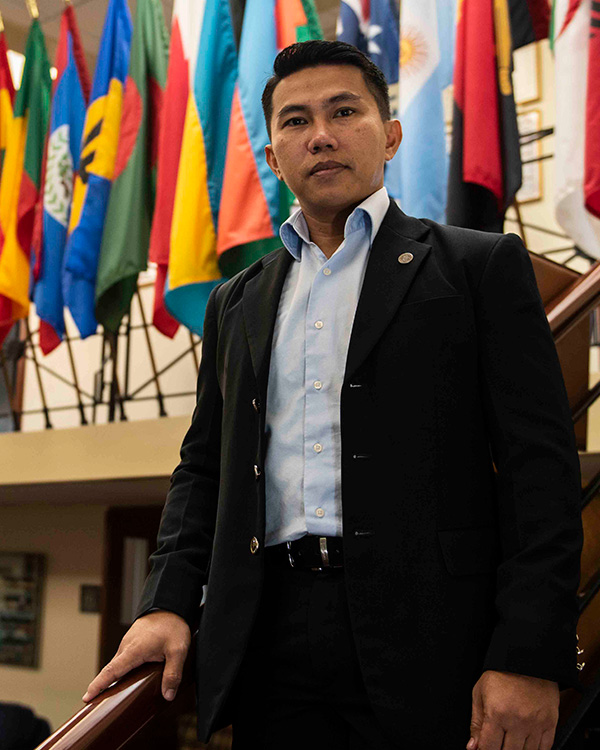
Lt. Cmdr. Ahmad Ikhlas, Indonesia
(U.S. Navy photo by MC2 Tyler John/Released)
On stage, Lt. Cmdr. Ahmad Ikhlas wore a bright blue and gold shirt in the batik pattern of his native Indonesia. His wife, Nisa, wore a matching blue dress, and their children, 7-year-old Fathan and 3-year-old Nayra, had outfits in the same pattern.
Back home, Ahmad Ikhlas explained afterward, people wear batik patterns at official events. That was just one of the pieces of Indonesian culture that he and his family shared as part of their presentation to his class. Afterward, they and another Indonesian officer presented a lunch of Indonesian fried rice, shrimp spring rolls, spicy noodles, meat on skewers and sweet corn soup.
“Don’t worry, in my country you will never go to sleep at night with an empty stomach,” Ikhlas told the crowd. “I encourage you to visit and explore our beautiful Indonesia.”
Back home, Ikhlas has served as a navy surface warfare officer since 2004. He said this year at the U.S. Naval War College will undoubtedly enhance his career.
“It will give me another perspective of international relations. We learn about international studies, strategy and policy, in an American way. So we can compare it with ours,” Ikhlas said.
“At the Naval War College, the professors encourage us to have critical thinking, that is what I like. In the class, there is no right or wrong. In the end, it is your ability to explore, to elaborate and to see the situation in many different perspectives,” Ikhlas said.
This is the family’s first time on the U.S. mainland. Ikhlas said he sees similarities, as Indonesia is the world’s third-largest democracy.
“The United States is a huge country. In Indonesia, we have also multiple ethnic races, religions and cultures – America has the same,” Ikhlas said. “So we share many things in common, and hopefully we can maintain our good partnership to promote peace and prosperity all over the world.”
Nisa Ikhlas is a physician. While her husband studies military strategy, Nisa takes English classes twice a week and is exploring New England.
“Sometimes we go to someplace beautiful in Newport. Mansions, there are many mansions in Newport that we love,” Nisa Ikhlas said.
They’ve also tried Maine lobster. And, “What do you call the soup? The famous soup?” Ikhlas asked. Clam chowder. “That was interesting,” he said.
From Latin America
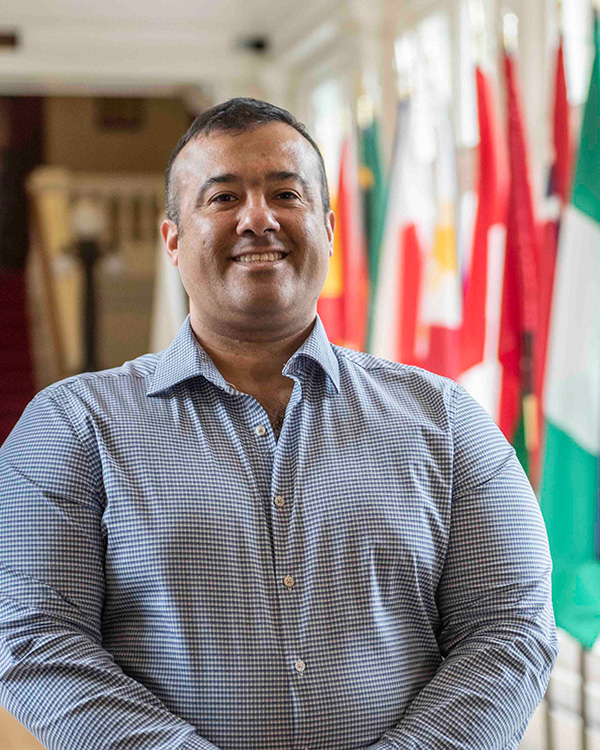
Capt. Americo Amico, Peru
(U.S. Navy photo by MC2 Tyler John/Released)
A graduate of the Peruvian Naval Academy, Capt. Americo Amico came to the U.S. Naval War College after 23 years as a line officer in his nation’s navy.
He described academic life in Newport as robust and said he will see what he can take back to Peru.
“You have a lot of case studies of wars, of operations, of conflicts that make the experience very rich, and also the experience of the professors make this school very rich,” Amico said. “And also your classmates, that sharing environment, people with many different backgrounds.”
Amico said he is getting a lot out of the field study trips, such as the visit to the New York Stock Exchange this fall. Prior to this year, he had largely only visited U.S. cities with U.S. Navy bases.
“You discover another United States. I have been following American studies, and now I understand much more,” said Amico, who is a native of Lima. “We were in the stock market on Wall Street, and we saw how the world changed after 9/11.”
Amico said that he and his classmates see a friendly rivalry with the Class of 1993, which has had the highest percentage of alumni become heads of their navies.
“They will stop speaking about the Class of 1993, and they will start to speak about the Class of 2020, the best one,” Amico said, laughing. “I hope my future will be CNO for the Peruvian Navy. I will try to do my best, step by step.”
Amico is in Newport solo, though he intends to bring his 12-year-old son to visit during the year as a chance to improve his English.
“The real goal is to know another country, another society, to know what kind of values are provided by the United States for its citizens. It’s a good opportunity to grow up in that way,” he said.
“It’s a magic moment when you discover that the world is more equal than different,” Amico said.
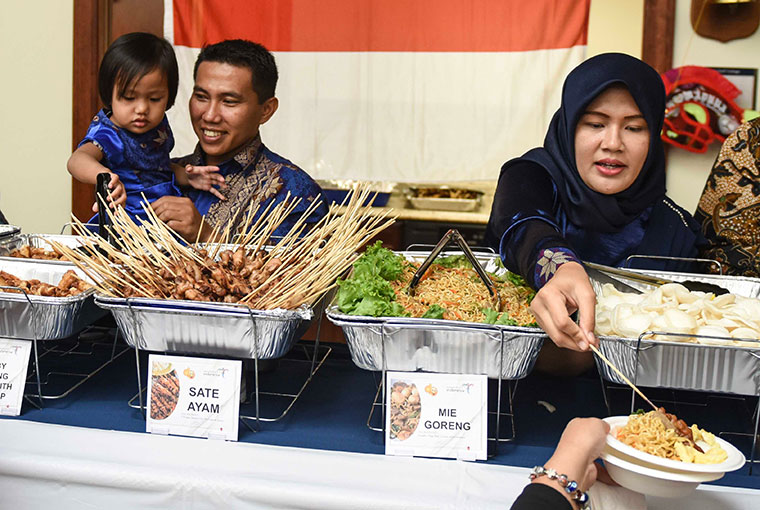
Indonesian naval officer Lt. Cmdr. Ahmad Ikhlas, his daughter, Nayra, and wife, Nisa, serve Indonesian food as part of their country presentation to classmates in the Naval Staff College.
(U.S. Navy photo by Mass Communication Specialist 2nd Class Tyler John/Released)
